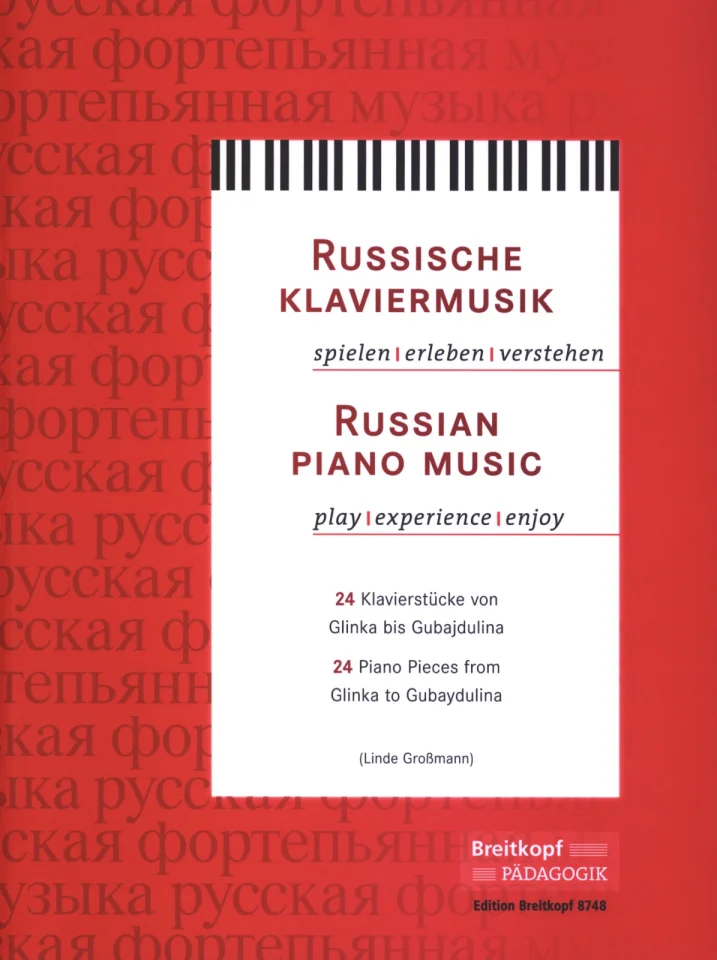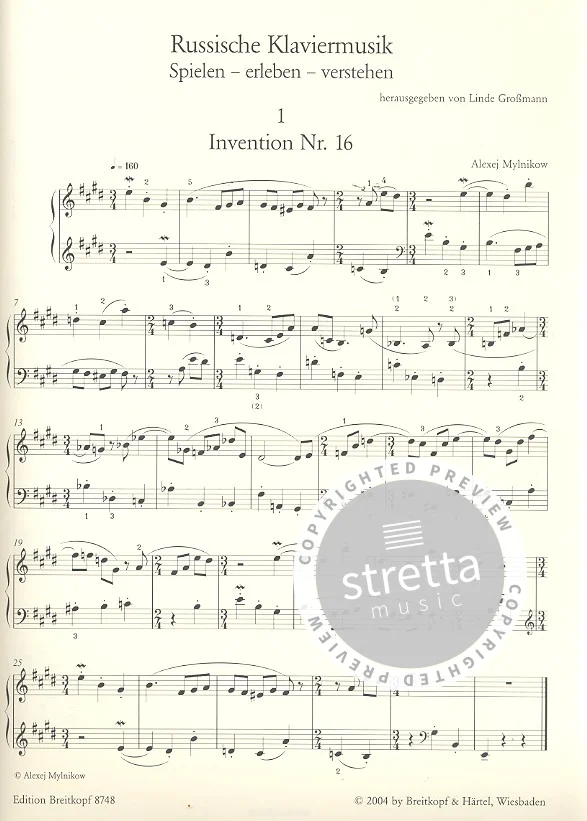New and traditional pieces from Russia, the land of the piano
Glinka and Gubajdulina are the chronological cornerstones featured on the cover. But in between, youll find well-known composers (Mussorgsky, Rimsky-Korsakov, Glazunov, Scriabin, Kabalevsky, Shostakovich) and exciting new discoveries (Gravilin, Kossenko, Mylnikov). The result is a well-sorted mixture of "Russian Piano Music." Russia, a land with a long pianistic tradition, is presented here in a multi-faceted way with a compelling assortment of pieces. The subtitle "Play-Experience-Enjoy" also keeps its promise: these 24 pieces, ranging from easy to moderately difficult, are supplied with extensive comments of special interest to piano teachers by the renowned pedagogue Linde Grossmann.
To the sample of notes Glazunov, Miniature
The charm of this little piece is enhanced by a harmonic peculiarity: it cadences in C major at the beginning, at the start of the recapitulation, and at the end (where it is further reinforced by a four-measure pedal point); but otherwise it raises the question as to whether it might not be in the parallel key of a minor after all. This ambiguity and avoidance of clear cadences in the course of the work gives the piece a strong inner cohesion in spite of the broadly observed structure in groups of four measures. This large-scale plan suggests that Glazunov's experiences in the domain of large symphonic works might have found their expression here in a smaller dimension as well. The capricious character of this piece is also emphasized by the transparency of the piano writing and by a rhythm that recalls the mazurka (the frequent dotting of the first quarter and accented, extended third quarters in the measure). The many arpeggiated chords keep the sound from becoming too thick. Try to avoid using arm pressure and concentrate instead on a rapid alternation of the fingers. While the staccato eighths in the accompaniment at the reprise heighten the general lightness of the piece, they should not affect the use of the pedal.
Introduction
The Russian school of piano playing has been acclaimed as one of the best in the world since the late 19 th century and has produced countless major artists and teachers. To this day, Russian piano teaching boasts a remarkably high Standard, even on its lower levels. This is due in part to the solidly conceived structure of the pedagogical repertoire which places the emphasis on Russian music. The most outstanding feature of this music is its idiomatic pianistic character, which predestines it for instructional purposes. Although piano music was not always in the forefront their uvre, Russian composers in the 19 th and 20th centuries were generally superior pianists, and some were even concert artists. Very knowledgeable about the piano's wealth of sounds and virtuoso effects, they often seemed to compose their pieces directly into the players hands. It is thus not only instructive to play this music but also, and above all, a great pleasure. It gives one the feeling of possessing a mastery of the instrument and commanding the full extent of its sound potential. This collection or works by a number of important composers seeks to trace the development of Russian piano literature from the early 19th Century to the present, i.e. from the genesis of an independent Russian piano style up to our time. The book contains pieces in the major genres from this period: variations, dances, lyrical and polyphonic pieces, character pieces and etudes (sonatas had to be omitted because of their length and level of difficulty). There are well-known pieces and lesser-known works in equal amounts.
As to their technical requirements, the examples were chosen so as to include as many different challenges as possible (use of the entire keyboard, pedal, passage, work, chordal writing, octaves, polyrhythms, polyphonic writing, cantabile, alternating hands, etc.). Unfortunately the restricted scope or the book and the limitation pieces ranging in difficulty from easy to medium meant that some important composers and a number of rewarding instructional pieces had to be omitted (Borodin, Balakirev, Rachmaninov, Medtner, Prokofiev, Glière, Denisov, Schnittke). One can only encourage players continue exploring this domain on their own.
Each piece is supplemented by a brief commentary which proposes various ways of mastering the work, in addition to providing information on specific aspects of the work, technical tips, analyses of the piano writing and other elements. The selection reflects years of experience teaching and playing, and supports the aim of addressing general topics applicable to a number of works as well problems specific to the piece in question.
Linde Großmann


